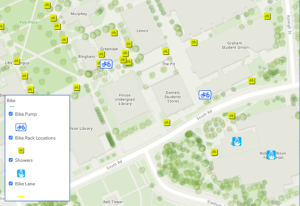Since 1956, The League of American Bicyclists has celebrated National Bike Month every May.
The celebration focuses on individual and community well-being, along with “safer streets, connected communities, a healthier planet, and happier people.” Bike to Work Week is coming up the week of May 16-22, and Bike to Work Day is on May 20.
Transportation is the largest contributor of greenhouse gas emissions in the United States, accounting for 29% of the total emissions in 2017. Green transportation has been at the forefront of discussion in Chapel Hill, especially with recent news of a growing electric bus fleet and plans for new bike and pedestrian paths in town.
For Go Chapel Hill’s Bike Month Celebration, UNC Transportation and Parking hosted its on-campus event, “May the Wheels Be With You,” on May 4. Transportation and Demand Manager Amanda Simmons spent the past semester organizing the event with her team.
“The Town of Chapel Hill and Carolina have been doing transportation demand management since before it was popular,” Simmons said. “Bicycling is a way to reduce traffic and improve air quality, so we’ve been collaborating for many years to encourage people to use sustainable transportation alternatives.”
During the on-campus event in Polk Place, Clean Machine, UNC Police, Go Chapel Hill, Bicycle Alliance of Chapel Hill, Transportation and Parking, and Sustainable Carolina set up booths. Students, staff, and faculty stopped by to learn more about cycling, register their bikes, and pick up essential safety items like lights.
Power of biking
In their 2017 article, John Pucher and Ralph Buehler describe cycling as an activity that causes “virtually no environmental damage.” Not only this, but it also promotes well-being and is economical, in terms of personal costs and infrastructure costs.
As a vehicle for commuting, biking can also help accomplish goals set forth by the United Nations’ Sustainable Development Goals. In total, there are 17 SDGs recognized in the 2030 Agenda for Sustainable Development. The goals look to end poverty, improve health and education, reduce inequity, and improve economic growth, while also improving the outlook on climate change and environmental preservation.
Though biking is an excellent form of alternative transportation, cycling safety is probably the most important factor that keeps people from riding bikes, Pucher said in a 2021 presentation for the Virginia Chapter of the American Planning Association. The pure number of motor vehicles, along with their increasing size and distracted drivers deter many would-be bikers from hitting the roads.
In the presentation, Pucher expressed the need for a more connected infrastructure, better bike training, and better teaching around respect for cyclists. If cycling were made safer, more people may commit to ditching their cars for shorter trips and hopping on their bikes instead.
Necessity of safety
This year, safe biking top is top of mind for the community following recent tragic events. UNC Transportation and Parking is committed to making students, faculty, and staff feel safer while biking around campus. In 2018, the League of American Bicyclists awarded UNC-Chapel Hill with its Bicycle Friendly University silver designation. Carolina was one of 16 universities to receive this designation in 2018.
The League recognizes institutions across the country for promoting and providing a bikeable campus for students, staff, faculty, and visitors. BFU designations are only awarded after a comprehensive audit and conversations with cyclists about their opinions and needs.
The Commuter Alternative Program and Cyclicious event during Week of Welcome, along with our bike share program and interactive bike map, made Carolina stand out in 2018. With the University’s BFU certification up for renewal this year, Transportation and Parking continues to work toward improved bikeability around campus.
“The BFU application gives us a detailed list about cycling infrastructure and education,” Simmons said. “Even though we reevaluate the University every year, every four years during the renewal process we make sure we are doing as much as we can to improve cycling.”


